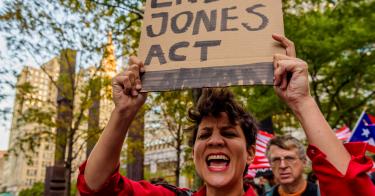To say that our fellow citizens in Puerto Rico and the Virgin Islands are suffering is a vast understatement. The combined punches of Hurricanes Irma and Maria have devastated the island territories.
Nearly the entire electrical grid was wiped out. In Puerto Rico, more than 80 percent of crops were destroyed. Over a week after Hurricane Maria, 44 percent of the population still lacked access to drinking water.
First responders wearing U.S. uniforms—mostly military—have been working with local emergency personnel to clear roads, restore power to hospitals, and deliver clean water to the many communities cut off.
As we support the relief effort and pray for those living day to day, policymakers in Washington should begin to look forward to the islands’ rebuilding and renewal.
With encouragement from Heritage Foundation experts and a bipartisan coalition, President Trump directed the Department of Homeland Security to issue a 10-day waiver of the commerce-killing Jones Act. But this is only a start.
The Jones Act, a 1920 measure that mandates all shipping between U.S. ports be done by American-made and manned vessels, was intended to vitalize the U.S. maritime industry. Yet it’s had the opposite effect. Instead of innovating, the U.S. shipbuilding industry hid behind the Jones Act and gave up the global ocean-going trade to Japan, Korea and China.
The result is that U.S. coastal trade is served by an aging, slow fleet of barges and tugboats. No place is hurt as badly as Puerto Rico, which faces shipping costs twice as high as nearby foreign islands not covered by the Jones Act.
After Hurricane Maria, the Jones Act has created an extra burden: It will prevent mainland suppliers of rebuilding materials from participating in the rebuilding effort.
To be sure, the aid chokepoint for the first weeks after the storm has been on land: There are not enough trucks available to move goods inland from the port of San Juan. But once roads are cleared and fuel restored, the cost of shipping will again be a major barrier to Puerto Rico’s commerce with the mainland U.S.
Mr. Trump would be wise to suspend the Jones Act for a longer time period. As Puerto Rico begins to rebuild its shattered infrastructure, demand for fuel, concrete, steel, copper wire, vehicles and building machinery will soar. As long as the Jones Act is in place, though, access to American suppliers will be limited, meaning less income for stateside workers and businesses, and higher costs for Puerto Ricans.
Mr. Trump should waive the Jones Act for as long as Puerto Rico is receiving foreign aid. An artificial barrier should not prevent this money from being spent on American goods.
In our system of government, however, the buck stops with Congress. And a few in the Senate recognize that it is unreasonable to expect Puerto Rico’s economy to thrive while it faces a serious trade barrier with the U.S. mainland.
Sens. John McCain and Mike Lee have introduced legislation that would permanently exempt Puerto Rico from the Jones Act, mirroring the exemption that the U.S. Virgin Islands have always enjoyed. With a permanent exemption, Puerto Rico would be able to rebuild its power plants to depend on natural gas from Texas and Pennsylvania, rather than buying oil from the socialist dictatorship in Venezuela.
Puerto Rico’s road to recovery will be long, and its road to economic renaissance even longer. But without policy reforms, that road will never be cleared. President Trump and Congress can take the first steps by waiving and then repealing the Jones Act for Puerto Rico.




